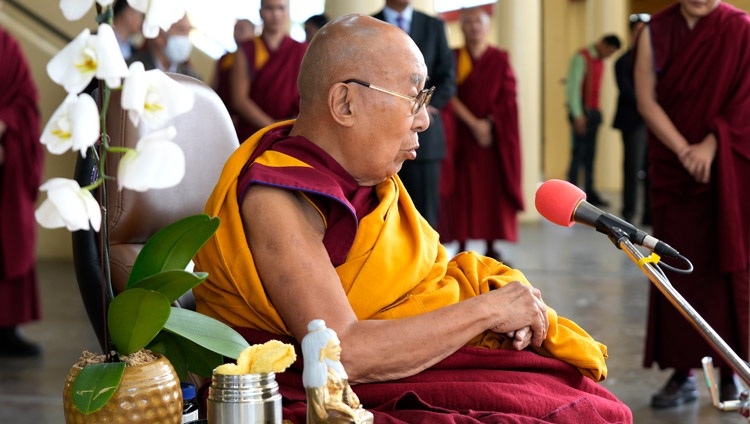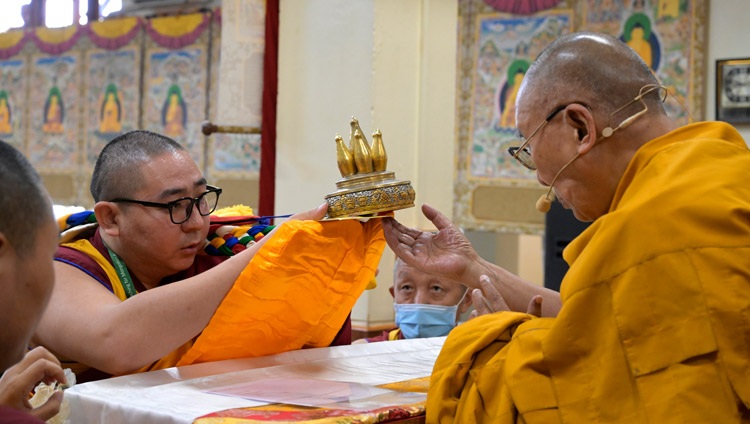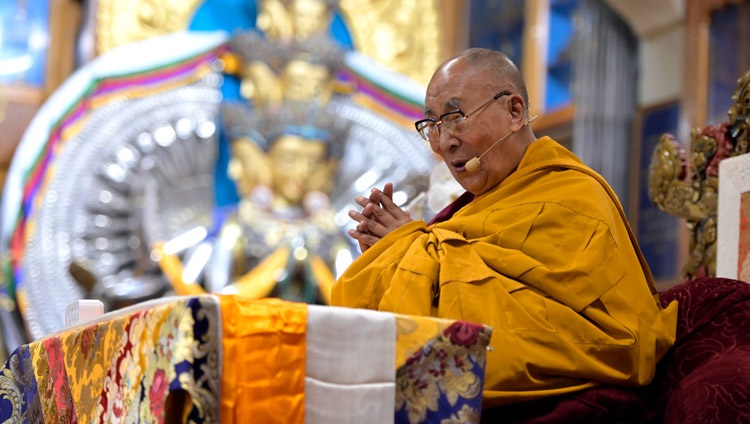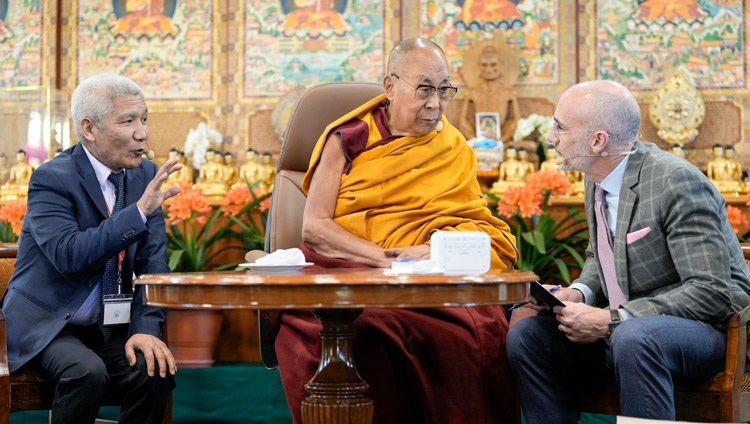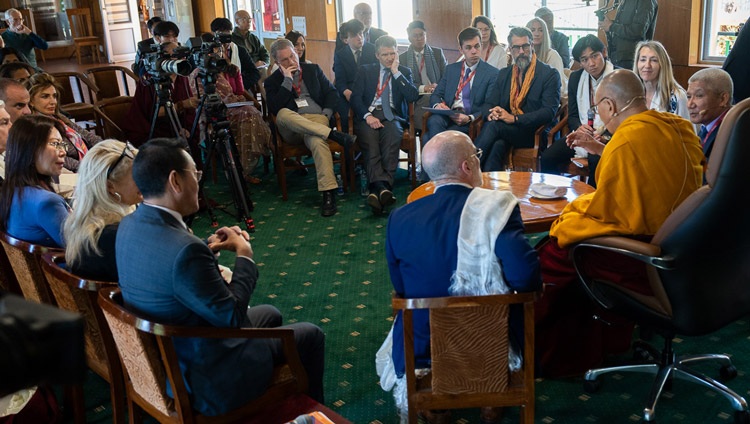Young Peacebuilders in Conversation with His Holiness the Dalai Lama
October 23, 2019
Thekchen Chöling, Dharamsala, India – This morning, the United States Institute of Peace (USIP) brought a group of 24 youth leaders from 11 conflict affected countries to discuss making peace possible with His Holiness the Dalai Lama. They came from Afghanistan, Colombia, Iraq, Libya, Myanmar, Nigeria, Somalia, South Sudan, Syria, Tunisia and Venezuela. The group also included young trainers, thought leaders and USIP staff.
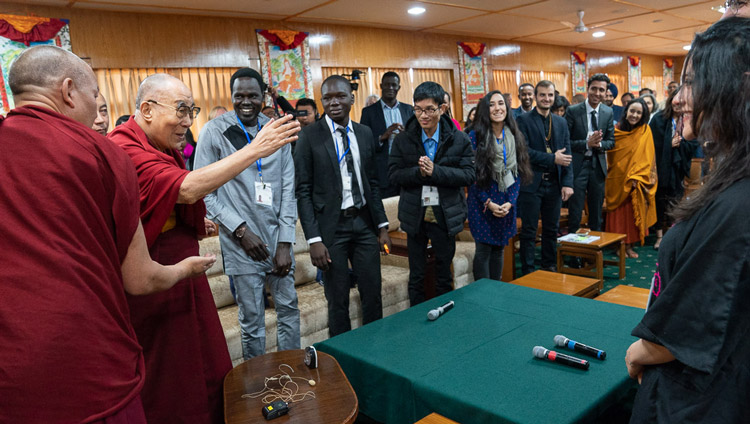
President of USIP, Nancy Lindborg moderated the conversation. She began by thanking His Holiness for welcoming a group of young peace builders for the fourth time. She told him she was going to ask them to introduce themselves when His Holiness intervened.
“For me the best introduction is the human face,” he told them, laughing. “When I see two eyes, one mouth, one nose, I know I’m dealing with another human being like me. I’m like those young children who don’t care about their companions’ background so long as they smile and are willing to play. To emphasise nationality, religion, and colour just creates division. We have to look at things on a deeper level and remember that we are all the same as human beings, physically, mentally and emotionally the same. It’s on this basis that I remind people of the oneness of humanity.”
Ms Lindborg explained that she hoped that over the next two days four topics could be discussed: building bridges in divided communities; how to be inclusive; building peace and resilience.
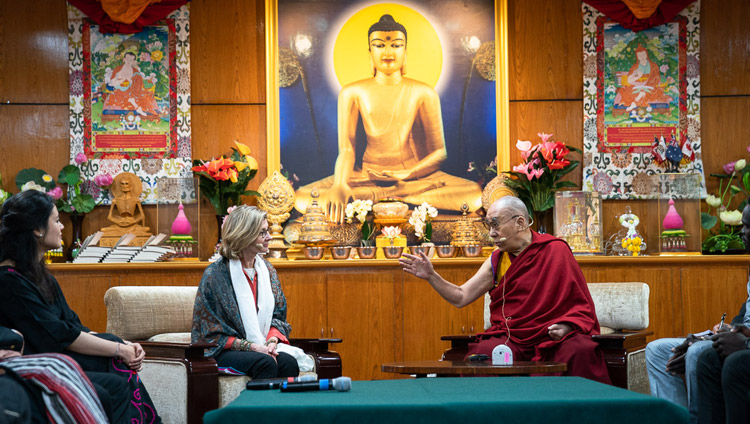
A youth leader from Myanmar recounted the trauma of his mother’s being killed by a member of another tribe and asked about hate speech among Buddhists. His Holiness replied that when he first heard about Muslims being harassed by Buddhists in Myanmar he advised that Buddhists should imagine a Buddha giving each of the Muslims protection. He mentioned that he had raised the matter with Aung San Suu Kyi, who told him that military involvement made the situation complicated and difficult.
“In such circumstances we have to think about how on a fundamental level we are human beings. Scientists observe that we are social animals. We depend on each other to survive. Not only is anger and hatred socially divisive, it’s bad for our health. We all want to live a happy life, to be physically healthy, but to achieve those goals we also have to cultivate a sense of emotional hygiene, learning how to tackle our destructive emotions, in much the same way as we observe physical hygiene.
“Our modern education systems, much influenced by the West, don’t reveal much understanding of how to transform our emotions. To do so, we have to use our intelligence, relying on knowledge rather than faith. We need to conduct ourselves with non-violence and on the basis of compassion cultivate respect for others.
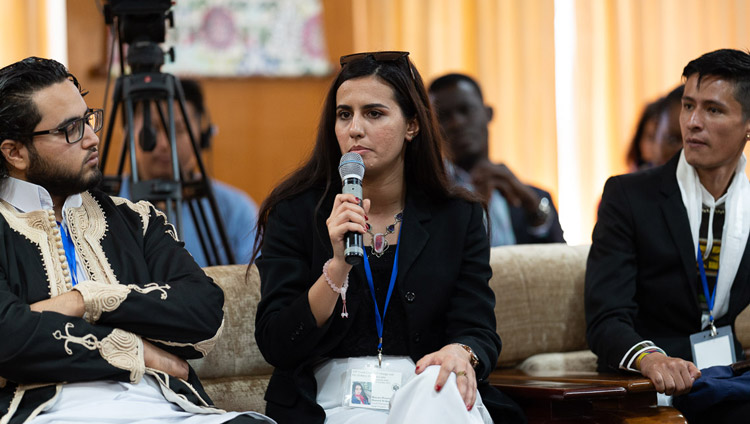
“All religious traditions involve human beings, and although they may adopt different philosophical stances, they focus on the best of human qualities such as love. They share a common goal of helping to shape happier individuals and, consequently, happier societies.”
A Tunisian peacebuilder wanted to know how to help marginalised people regain hope. His Holiness replied that he finds it helpful to think of himself as just a human being. Although originally from the Land of Snow, he reminds himself that fundamentally he’s just the same as other human beings. This seems to come naturally to young children. It’s only after starting school that differences of nationality, religious faith, race and family background, whether you are well-off or poor, comes to be emphasised. However, such differences are of only secondary importance. What is more significant is that as human beings we belong to one community.
His Holiness reported meeting a teacher in Soweto, South Africa, congratulating him on his country’s new-found freedoms and the opportunity for all its citizens to be equal. He was shocked when the teacher told him that such aspirations were impossible because black people’s brains were inferior. He remonstrated with him, insisting that the brains of black and white people are the same. He added that, on occasion, Han Chinese have expressed a prejudice that Tibetans’ brains are inferior to their own. In His Holiness’s experience the only real difference is in opportunity. When they have the same opportunities, Tibetans have proved themselves quite as capable as Chinese.
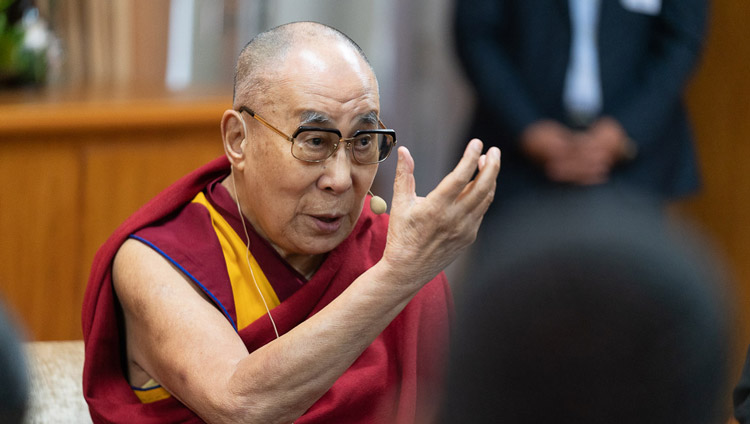
“Today, despite significant material and technological development,” His Holiness explained, “we face numerous problems of our own making. Some of them arise from seeing other people in terms of ‘us’ and ‘them’. Where education is incomplete, we need to combine a sense of warm-heartedness with intelligence. We must also make the effort to resolve differences with other people through dialogue, not violence.
“A complete education can focus not only on materialistic goals, but can explain how to tackle anger and self-centred attitudes and how to achieve peace of mind. Since destructive emotions like anger and attachment are based on ignorance, on misconceptions about reality, it’s helpful to analyse the difference between appearance and reality as quantum physics does.”
Other youth leaders wanted to know how to promote a sense of the oneness of humanity and how to heal a damaged community’s collective memory. His Holiness suggested that people ask themselves if the existing situation they find themselves in is satisfactory. And if they can’t bear the situation they’re in, they need to ask who or what is the source of their difficulties and take steps to allay it. He stressed that prayer by itself is not a practical solution, it’s always necessary to take action. He reiterated that many problems that come about as a result of unrealistic thinking can be corrected by education.
“If young people adopt a broader view, take a more realistic stance and make an effort, they can change the world,” His Holiness declared.
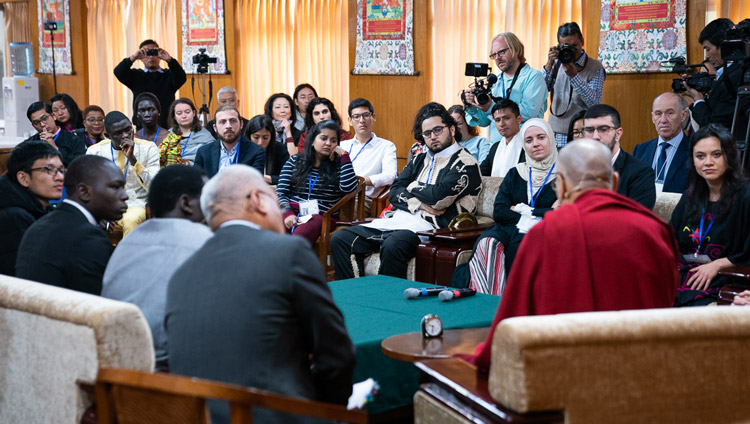
A young man who had already mentioned that his mother had been killed wanted to know how to go beyond the pain. His Holiness advised that patience and forgiveness create a positive atmosphere, whereas seeking revenge creates further enmity and violence always creates more suffering.
He added that there are times when the most sensible solution to a challenging situation is to walk away.
“In March 1959, in Lhasa, I tried to cool relations between Chinese and Tibetan forces until the situation ran out of control. When I realised I could no longer help in a peaceful way, I decided to escape, although as I left Lhasa, I had no idea if I would live to see the next day.
“If you can change the other person’s mind, well and good, but if not, you need to keep anger and hatred under control and consider just walking away.”
His Holiness was asked several times what young people can contribute to peaceful change.
“You need persistent determination and a belief in the truth. Working honestly and truthfully will in the long run give you great power. The power of the gun may have an immediate effect, but in the long run the power of truth goes on and on.”
The whole group ate lunch together and will meet again tomorrow.

